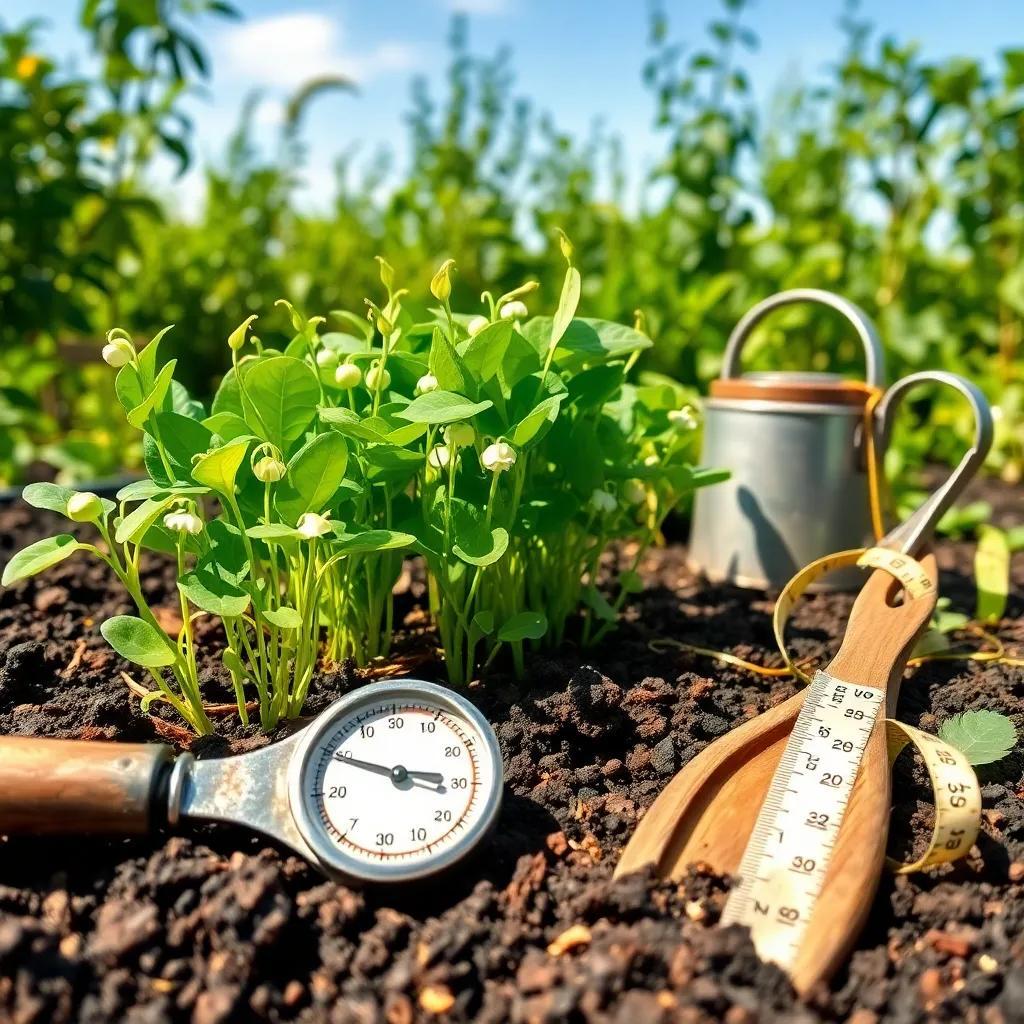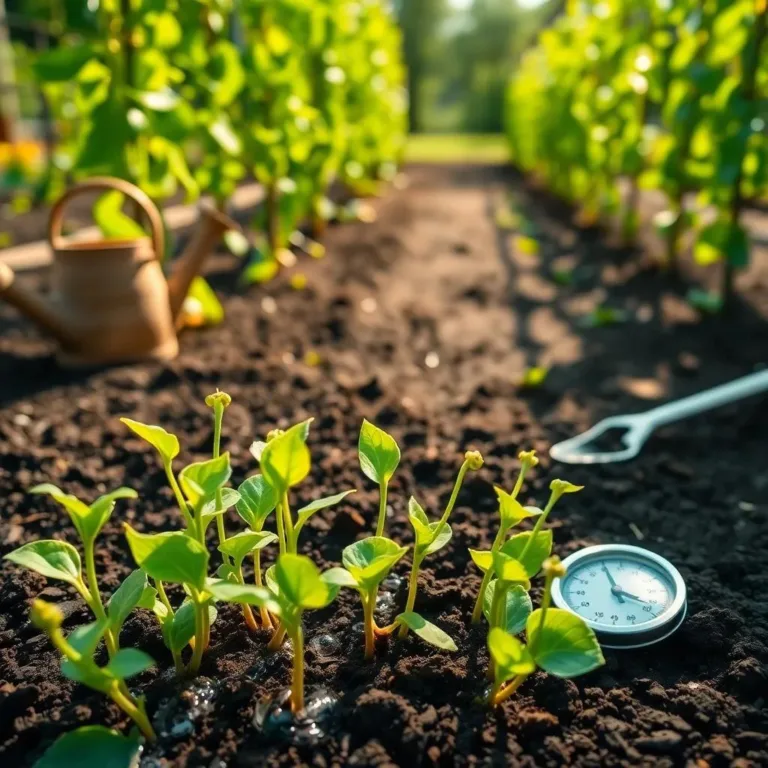Growing snow peas in my garden has been one of my favorite adventures! These sweet and crunchy little gems are not only delicious, but they’re also fun to cultivate. Want to learn how to get your snow peas sprouting and thriving? Let’s dive into the secrets of successful germination together!
Factors Influencing Snow Pea Germination Success
When it comes to growing snow peas, understanding the factors that impact their germination is like having a secret recipe! Every little detail matters, and if you get them right, you’ll be rewarded with a fantastic harvest. Let’s break down the big players that can make or break your snow pea adventure.
- Temperature: Snow peas like it cool! They thrive best in temperatures between 50°F to 75°F (10°C to 24°C). If it’s too hot or too cold, the seeds may just sit there, twiddling their thumbs. So, timing is everything!
- Moisture: Just like me after a long run, snow pea seeds need their hydration! Keeping the soil moist but not soggy is key. Consider watering them regularly, especially if the weather is dry. Nobody likes to be parched, right?
- Soil Quality: The right soil can make a world of difference. Snow peas love well-draining soil rich in organic matter. Adding compost or well-rotted manure will make the soil a happy place for your seeds to sprout.
- Sunlight: Give those peas plenty of sunshine! Ideally, they need around 6-8 hours of direct sunlight each day. If some plants are casting shade over your seeds, it might be time to relocate them!
- Seed Quality: Quality matters! Always pick fresh seeds from reputable suppliers. Old seeds might be like a tired old fruitcake—hardly sprouting at all! Check the expiration date and ensure they’ve been stored properly.
- Seed Depth and Spacing: Planting your seeds at the right depth (about 1 inch/2.5 cm) and spacing them properly (around 2-3 inches) will prevent overcrowding. Too close together and they’ll be fighting for resources—like siblings over the last piece of cake!
By keeping these factors in mind, you can create the perfect setup for your snow peas to thrive. Let’s get those seeds sprouting!
Creating Optimal Conditions for Snow Peas to Germinate
Once we know the key factors, it’s time to talk about how to create a delightful environment for our snow peas! Think of it as setting up a cozy little home for them. Here’s how to do it!
- Set the Right Temperature: Use a soil thermometer to check that your soil temperature is just right. If you’re planting early in the season, consider using row covers to keep the chill away during colder nights.
- Moisture Maintenance: Stay vigilant! Keep the soil consistently moist. I like to check my garden daily, and give it a little drink if it’s feeling dry. A layer of mulch can also help retain moisture and keep the soil temperature steady.
- Soil Prep: Before planting, mix in some compost. This helps improve soil quality and provides nutrients that will help your seedlings grow strong and healthy.
- Sunshine Access: Choose a sunny spot! If your garden gets a bit too shady, consider trimming back nearby plants or opting for a different location where the sun shines bright.
- Planting Depth and Distance: Remember to plant those seeds about 1 inch deep and spaced apart! It gives each plant room to stretch its roots and leaves without competing with its neighbors.
- Germination Time: Be patient! Snow peas usually take 7-14 days to germinate. During this time, monitor your seeds and keep the conditions just right.
By creating these optimal conditions, you’re giving your snow peas the best chance to sprout and grow! Happy gardening!

Understanding the Duration of Snow Peas Germination
Now that we’ve covered the factors and conditions, let’s talk about the duration of snow peas germination. It might feel like waiting for popcorn to pop, but trust me, it’s worth the wait! On average, snow peas take about 7 to 14 days to germinate. But, oh boy, this timing can vary based on several factors!
What Affects Germination Time?
- Temperature: Remember how picky snow peas are about their temperature? If the soil is just right—between 50°F and 75°F (10°C to 24°C)—things can speed up. But if it’s too cold or too hot, germination may slow down.
- Moisture Levels: Keeping the soil moist plays a huge role. If the soil dries out too much, it can delay the sprouting process. I always make sure to check my watering can regularly!
- Seed Quality: Freshness counts! Using high-quality seeds can mean faster germination. If the seeds are old or have been stored poorly, they may take longer to sprout—or worse, not sprout at all.
- Soil Conditions: Well-draining, nutrient-rich soil is like a five-star hotel for seeds. If the conditions aren’t right, it might take longer for your little sprouts to show.
The key takeaway is to be patient! Monitor the soil, keep it moist, and provide the ideal temperature. Watching the seeds sprout is like waiting for a surprise gift—you’ll appreciate it even more when it finally happens!
Tips to Enhance Snow Pea Germination Process
As if growing snow peas couldn’t get any more exciting, here are some tips to enhance the germination process! Think of these as secret ingredients to help your seeds sprout quickly and healthily.
- Pre-soaking Seeds: Soaking your snow pea seeds in water for 8 to 12 hours can work wonders! This softens the seed coat, making it easier for them to sprout. It’s like a little spa day for your seeds!
- Scarification: If you’re feeling adventurous, try lightly scarifying the seed coat with sandpaper. This helps water penetrate better, giving germination a boost!
- Soil Preparation: Mix in some compost or organic matter before planting. This not only nourishes the seeds but also improves the soil structure for better water retention.
- Keep it Consistent: Maintain that ideal moisture—don’t let the soil dry out! If it’s super hot outside, consider providing some shade for the seeds. They’ll thank you later!
- Thin Out Seedlings: Once your lovely seedlings emerge, it’s time to thin them out. It may seem mean, but this means more room for the strong plants to grow without fighting each other for space.
By following these tips, I promise you’ll set your snow peas up for success! With a little care, you’ll soon have a flourishing garden of sweet and crunchy goodness!
Frequently Asked Questions about Snow Pea Germination
I love answering questions, especially about snow peas! So, let’s tackle some frequently asked questions regarding their germination process. Feel free to explore these tidbits—there’s a lot to learn!
What Are the Ideal Conditions for Snow Peas to Germinate?
Snow peas flourish in cool weather! They prefer well-drained soil that’s rich in nutrients and gets plenty of sunlight—around 6-8 hours a day.
How Often Should I Water Snow Peas During Germination?
Keep the soil consistently moist but not soggy! I usually check the moisture levels daily. You might need to water them every day or every other day, depending on the weather.
Can I Speed Up the Germination Process of Snow Peas?
Absolutely! Soaking the seeds before planting can significantly speed things up. If the seeds feel a bit lazy, this trick can wake them right up!
What Should I Do If My Snow Peas Are Taking Longer Than Expected to Germinate?
If it’s taking longer, cover the soil with plastic wrap to keep moisture and warmth in. It creates a little greenhouse effect, which can help speed up germination!
How Long Does It Usually Take for Snow Peas to Germinate?
Typically, snow peas take about 7 to 14 days to germinate. Just be patient and keep an eye on those seeds!
With these answers in hand, you’re all set to grow your snow peas! Happy gardening, and may your garden be bountiful!

